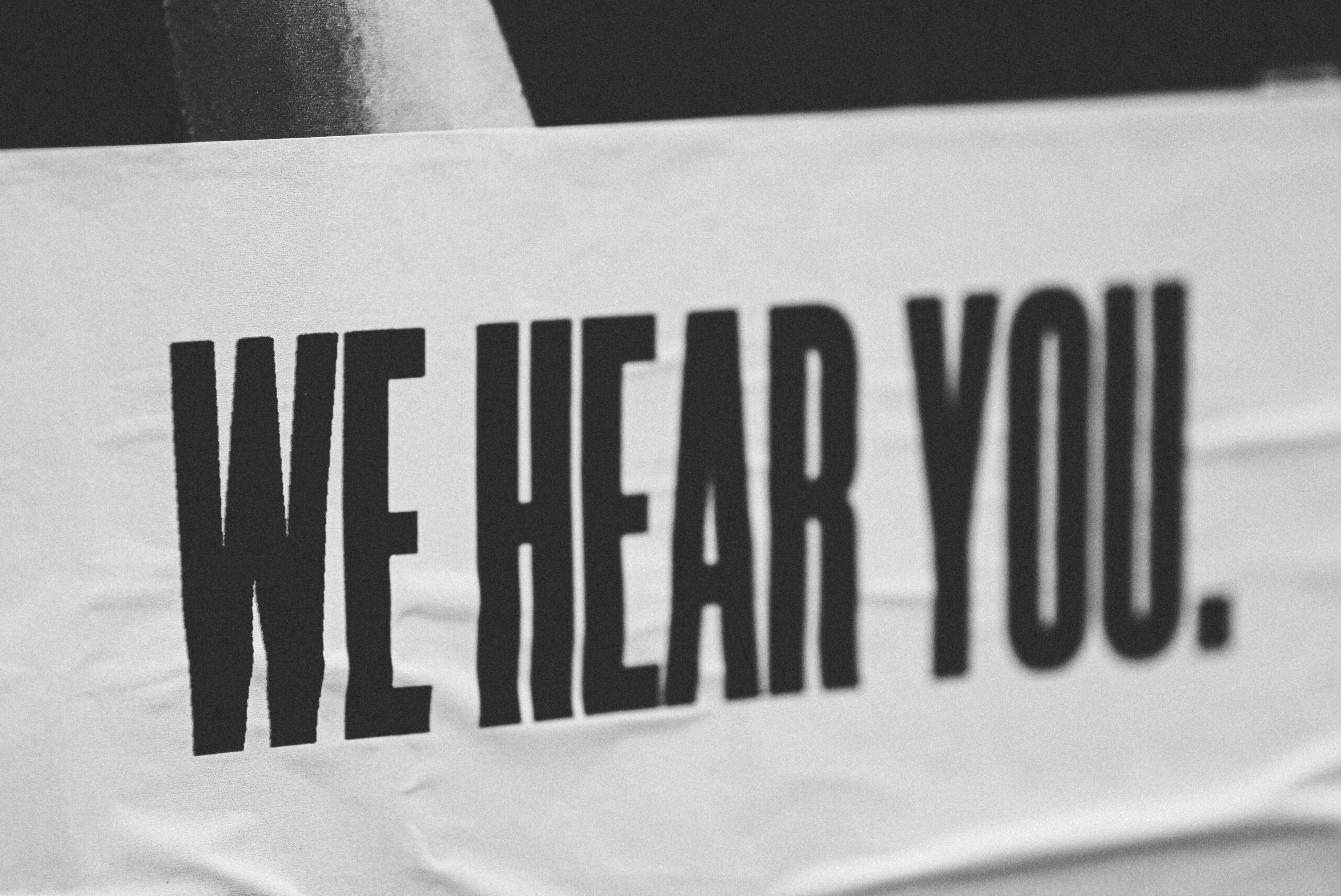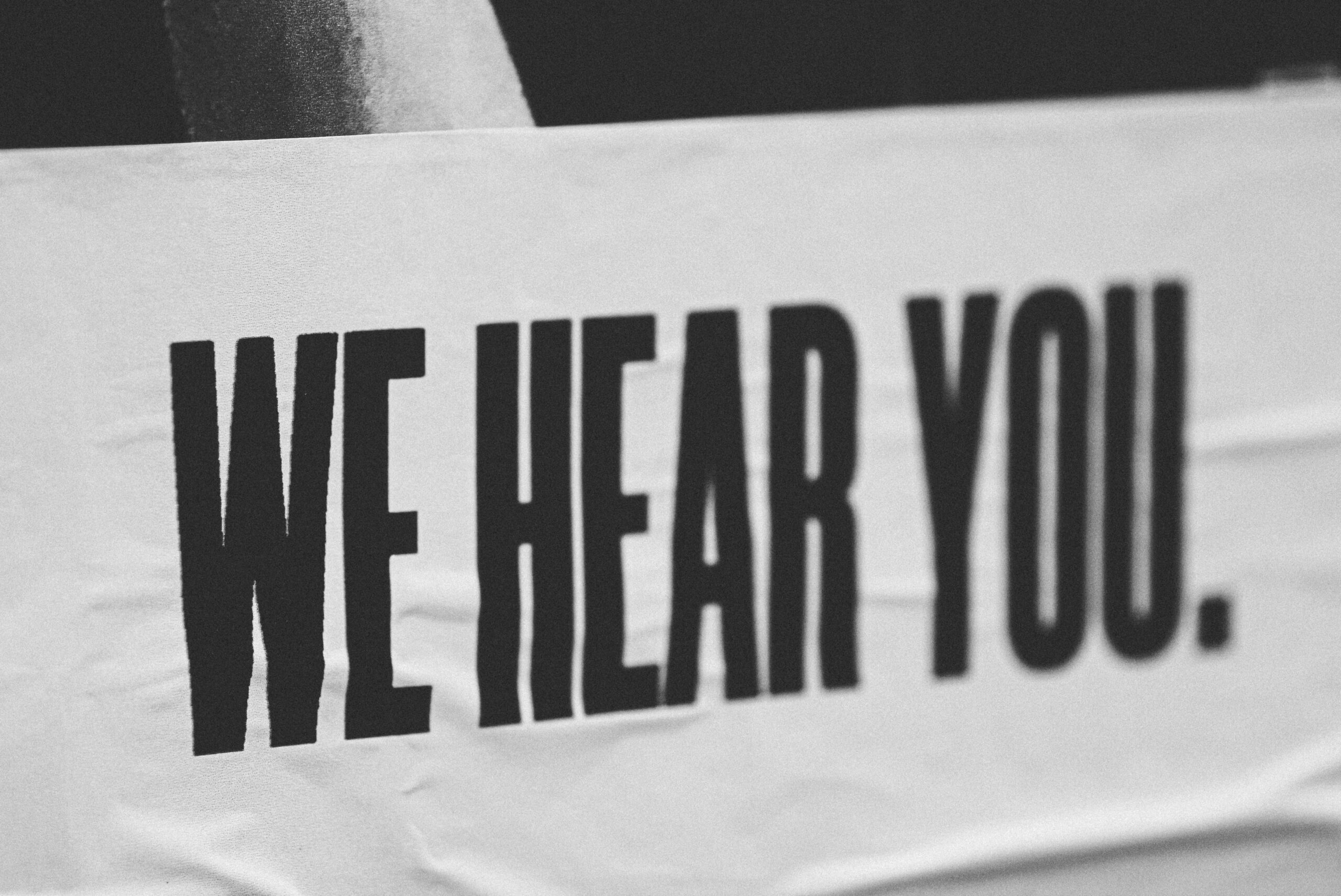
Communication, Leadership
The doing versus the being of listening. There are no shortcuts if you really want to connect with people.
“My boss says all the time now, ‘I hear you,’ when I’m telling them something. But the problem is, do they really? It feels like they’ve been on a leadership course, and this is something that they’re trained to say. Is this the case? Is that what you’re teaching people these days?” I don’t blame her for being upset. When I hear things like this, I want to bang my head against a wall. It’s a perfect example of hearing something in a leadership class, and then applying it on autopilot as a box tick exercise. People aren’t stupid, and they can always smell when someone isn’t being authentic and is just going through the motions. I’ll just say the things they tell me to say. And that will get the result I want. Wrong. Leadership skills aren’t meant to be a crash course in manipulation. And even though I often say leadership is more about who you are being than what you are doing, there are still so many folks who show up to a course looking for a quick tip or trick that will miraculously transform a relationship without putting in the hard work. The doing versus the being of listening Let me explain what I mean by doing and being. Doing – is about developing leadership skills and practising them until they form new habits. It takes persistence, practice, and hard work. These could be skills pertaining to having feedback conversations, listening skills, performance conversations, delegating tasks, coaching, giving presentations, time management. These are some of the skills related to successful leadership and we must practice them, as the more we practice the more leadership competency we build. Practice makes better. Being – is a journey of leadership self-exploration. When we are more self-aware and accessing our Learner Mindset we can manage our well-being, build stronger relationships, innovate, and deliver higher performance levels. Being is about how you are showing up. Are you just going through the motions, or do you really care about your employees, the team, and the work product? If you value things like integrity, is that visible to others in our behaviour? Would others describe you as a person with a high degree of integrity? The question I often ask leaders to explore this aspect of beingness is “Why on earth would anyone follow you?” It’s meant to be provocative, because there is often a disconnect between how we want to be perceived and how our beingness is landing with others. So back to my participant’s question. One of the skills that I often illustrate is acknowledging and validating what you’re hearing another person say. That goes way beyond parroting a phrase like, “I hear you.” Here’s what I said to that participant: “It sounds to me that you’re frustrated. And it makes perfect sense that you would be because I’m hearing that authenticity is important to you. You wonder whether your boss is paying attention, or just parroting something they’ve been told
September 14, 2023
|
4.1 min read

Communication, Productivity, Well Being
What messages about your availability are you inadvertently sending? Part 1 – Email -How to set boundaries at work
I’ve decided to write a multi-part blog on a topic that is so important, it warrants a little extra attention. I was talking about how to set boundaries yesterday with a client, a freelancer who is working on growing her business, and struggles to optimize her time effectively. I think many of us fall into this bucket. I mean, who really does have perfect time management skills? But all the fancy apps and time management tricks mean nothing if we don’t challenge the limited beliefs that are guiding the everyday choices we make. Our beliefs about availability drive our behaviors I’ll give you an example. My IT guy, James (who is awesome by the way) has a way of working with clients, which he communicates clearly. I know in an emergency I am to call him immediately. A real emergency, not a fake Shelley kind of emergency like “could we change the color of the banner on my website – it looks too blue?” James knows me all too well… So far, I’ve only had to do this once, when my site domain got hijacked and my website got pulled down – a real thing by the way, and now I’ve learned all about the importance of 2-factor authentication. But I digress… Otherwise, if there is something non-emergency related I need I am to email him. James checks his email twice a day, once in the morning and once in the late afternoon. And aims to respond to client requests within 1-2 working days. If something is going to take longer than that, he gets back to me with a time estimate of when he can most likely complete the task. It’s a clearly communicated policy of how he deals with email and client requests. It’s so simple, it’s so brilliant, it’s so effective, and yet, most of us do the complete opposite. Why? Because deep down there’s often a dark, hidden, limited belief lurking in the shadows that says something like – “You have to be available all the time.” Or “If you’re not available, people won’t be able to trust you and rely on you.” Or “You have to be available 100% of the time for your clients or your business will fail.” Sound familiar? The people pleasing poison These beliefs are rooted in what I call one of the three poisons – or reactive tendencies that end up creating a lot of problems in our life and leadership. This particular poison is the one of the people pleaser – My self-worth is related to how much people like me. And we human beings are super inept at sitting with the discomfort of feeling like we are not liked. Notice I say “feeling” because often this is our perception, and perception does not equate to reality. Healthy people respect and honor appropriate and properly communicated boundaries. And because we’re not conscious these fears are lurking in the background, then we do stupid things like have the email notification
June 30, 2023
|
4.3 min read

Communication, Emotional Intelligence, Leadership
The (more subtle than we realize) Art of Listening
Recently I was helping facilitate a program on coaching for leaders, and on day 1 we spent quite a bit on time on the subject of listening. You may wonder why, considering it’s something we do every day and most of us think we’re more than competent when it comes to this skill. Think again. “This is hard!” “I keep wanting to butt in and offer my thoughts or advice.” I so appreciated the honesty and vulnerability from the participants. The bottom line is that most of us are average at best when it comes to this skill. And the problem is if you’re a leader looking to inspire and motivate your team to greatness, average just won’t cut it. This reminds me of a story from many years ago. I was speaking with someone who was known in the organization I was working for at the time to be a great leader. A fantastic reputation, the kind of person people sought out to join their team. So I asked this individual, what’s your secret. I was expecting something magnanimous, something I’d never thought of before. Some simple but not easy advice on listening The response caught me by surprise. “I give whatever or whomever is in front of me 100% of my attention.” I was underwhelmed to say the least. But they were really on to something. Because the reality of how we show up is often quite different. Let’s take the following scenario: Someone pokes their head in your office – “Do you have a minute?” They ask. “Sure!” you say, wanting to sound interested and helpful. You’re the boss that cares. You’re approachable. People like you. They walk in and your eyes are still on the email you were in the middle of writing. Your thoughts are still halfway consumed by it. You’re unaware you’re doing this. You’re halfway listening to what they’re expressing. You’re nodding your head in agreement, eager to get back to your draft. They leave and you carry on, you barely notice the interaction and later you forget all about it until they awkwardly remind you of what you’d agreed to in that moment. Listening isn’t an innate thing we can take for granted. It’s a skill. And just like any skill there is a methodology to it and we must practice it. The levels of Listening Level 1 – Halfway listening. In the previous example the manager I mentioned was listening at the equivalent of level 1. They’re halfway there, they’re caught up in their head in something else. They really didn’t have the time for the interaction but instead of setting a boundary and asking the person to please come back later, they acquiesce. The result is they’re not present, they’re not tuned in, and the person on the receiving end of the conversation knows it. The employee with the question leaves disengaged and slightly annoyed. People know when they’re not being listened to. Another version of level 1 is what
March 16, 2023
|
5.4 min read

Communication, Leadership
Silence Really Is Golden
Yesterday I was teaching a leadership class, and we got into an interesting conversation about zoom, and given the fact that so much happens in the virtual world now the question was: How do you effectively engage with people in a virtual environment and create meaningful connection? My leaders were voicing their frustrations about the lack of “real” connection in the virtual world, and how you get team members who are on the quieter side to speak up, to participate, to engage, particularly in a group setting. “I’m often looking at a screen of black boxes with people’s names. I ask if there are any questions when I’m finished sharing my thoughts, and it’s just crickets. And then I just move on to the next item.” The scary sound of silence The dreaded sound of silence. The awkwardness of it. I remember when I first started facilitating, I was afraid of it. What if I ask a question and it doesn’t land? What if the participants aren’t getting it? What if they think I’m a fool who has no idea what she’s talking about? When I first started out, I tended to rush through the content, because awkward silence was scary. I would fill it with my worst fears about my performance. I would imagine folks were thinking horrible things about me, the material, or the learning experience. I was afraid of silence. And to be frank, I think most people are. We’re not used to silence We live in a busy world, full of notifications, full of ims and dings and the next thread on slack to respond to. It’s not often you hear silence . I doubt we’re even used to it anymore. There’s often a tv playing in the background in the airport, the radio or podcast we listen to in the car, even in my old office in Houston CNN was always running on the monitor in the background. Noise is everywhere. Silence is a gift And then another participant in my class shared something interesting. “You know, my manager brought me in the other day to facilitate a team session for a group that he warned me in advance was often quiet. He told me they probably wouldn’t have any questions. They wouldn’t engage. So I thought hard about how to approach them to get a different result. I started off the session slowly and methodically and told them that I’m comfortable with silence. I’m not in a rush, we can take all the time we need for this experience. And then I sat back and patiently waited. And the questions kept coming, 8 in total, when they’ve never asked one before.” The story didn’t surprise me. Probably the hardest thing for me to learn over the years as a facilitator of learning was to embrace silence. To learn to love it, and to use it like Erika did in this story effectively. Because the truth of the matter is, there is magic in silence
October 28, 2022
|
4.2 min read

Communication
Feeling resentful about something? Think about this.
Giving feedback is never an easy task. I’ve recently mused about this topic quite a bit, and written a blog recently on the art of straight talk, which highlighted the three elements that are critical to doing this well. And then there’s real life. It’s one thing when it’s a colleague. It’s another thing when that colleague is also a very close friend. My friend Jenny and I have known each other for years, and we’ve also collaborated on a number of projects. She’s one of my favorite people, she’s funny, insightful, hardworking, caring and full of entrepreneurial spirit. She’s commonly the ideas person in our dynamic duo, and I work behind the scenes to help execute her ideas. Lately I’ve been experiencing some frustration relative to what I’m calling the whiplash effect. She has a grand idea, I rush behind the scenes to make it happen, and then it gets shelved. we create resentment when we don’t speak up And so, a couple of glasses of sparkling rose into a business lunch we were having the other day, out it came. I shared with her my frustration, and the grief this had been causing me. It wasn’t a perfect delivery as far as feedback is concerned. I didn’t follow each of the straight talk steps in perfect unison, but then again perfect is the enemy of good. I was still scared, even though she’s my friend. I was scared especially because she’s my friend and this relationship really matters to me. I fully expected her to listen, and she did. I fully expected her to acknowledge the frustration and the mixed messages she’d been sending, and she did. What surprised me was the text she sent me later on. “I’m going to do better.” And she expressed sincere concern for hurting my feelings and sending mixed messages. I had to ask myself why I was so surprised. And then I had a realization. I’m not used to people owning things. I’m not used to reciprocity in relationships. And this isn’t because I think other people are inherently selfish, or I was picking horrible people to surround myself with (although in some instances I could have done a better job on that front). In the past I often took the path of please and appease rather than assert myself and share my concerns. I took that path because I was desperate for people to like me, to have a ton of friends in my network. Unconsciously, this was a hidden measure of success. Interestingly it didn’t matter whether I liked them. I got used to giving more than my fair share. I got used to not sharing my voice or truth on things, then feeling resentful, and rather than expressing it, shoving it down and shaming myself instead. Then I’d have to find ways to numb the pain. Or it would spill out in other passive aggressive ways and ultimately pollute the relationship. when we know our worth, we can
September 2, 2022
|
4.3 min read

Communication
The Problem with Feedback
The other day I got my student feedback from a course I teach each semester on Managing without Authority for a local university. I opened it up, excited to see what the students said, and my eyes were drawn to the one respondent that disagreed the course was valuable, and also disagreed I was knowledgeable. In the free form feedback it said: “Too much reliance on students and not the teacher. We spent more time talking in groups than being provided real insight on managing without authority. If we asked a question, it was not answered and instead thrown on the class to answer.” My heart sank. And the mind monkey took off. I’d been outed. Because when I look deep at my own inner saboteurs, the one that screams the most is “You don’t know enough.” We Fixate on the Negative Feedback So that comment really stung. I’ve often noticed this tendency in life, where we humble human beings fall into negative confirmation bias. We look for the things that confirm our worst fears. Our worst fears are then confirmed, and we fixate on it. Never mind the 18 other people that strongly agreed that the course was valuable. Never mind the copious comments on how engaging the course was, how much they liked the case studies, my humor, the breakout groups. Never mind that these 18 thought I was knowledgeable. In that moment none of it mattered. This one individual in the six years I’d been teaching for this institution had finally seen the truth of me. The game was up. Unfortunately, I had opened this email in the middle of an important 3 day meeting I was participating in. And then I cursed myself for opening something that could be potentially triggering at a moment I needed to concentrate most. It took some effort, but I managed to steer myself back into the meeting and reground myself. Yay for mindfulness techniques! I spent a few moments practicing some deep breathing, focusing with my eyes on a few objects in my office that bring me joy and are beautiful to look at. Slowly but surely the dissonance faded away and I regained my composure. When will we be enough? But it got me thinking…it’s interesting this tendency we have to need to prove ourselves. We obsess about the big presentation that’s coming up, how we must be prepared and have the answer to every potential question under the sun that might be asked. We stress about the quality of our work. Is it good enough? Will people think that I’m credible and I know what I’m talking about? We stress about the quarterly performance review; will I be rated above average or exceptional? And what does it mean if I’m not? But here’s the bottom line – When do we get to enjoy things? When we know enough? Because that’s a fool’s game. Enough is never enough because there’s always something new to prove, someone new to impress,
July 20, 2022
|
3.7 min read
Communication
Shelley Pernot, otherwise known as the Irreverent Guru of Mindfulness, muses on life, leadership and everything in between. Your one stop shop for career tips, leadership tips and daily inspiration!

It was a privilege to work with Shelley as my leadership coach! The process was structured and yet flexible enough to meet needs as they arose. Shelley helped me to grow, learn more about myself, and to really achieve what I set out to accomplish. We worked on planning, navigating a promotion successfully, and so much more! I experienced many successes as a result of working with Shelley, she has great resources, knowledge, and really helps with setting the foundation to this coaching work. She won’t let you down!
Stacy Campos
Regional Coordinator
Having the opportunity to have Shelley as my Leadership Coach could not have come at a better time in my career. I was recently promoted to CFO and was new to the Senior Management Team. Shelley helped me navigate joining the team as well as helped me to determine who I wanted to be as a leader. The Leadership Circle Profile helped our team to discover our blinds spots and to be able to understand each other better. Working with Shelley not only has affected my professional life in a positive way, but also my personal life. She helped me take leaps and has given me the resources to continue this journey of self-improvement. If you’re looking to find more about yourself and how you can be the best version of yourself, I highly recommend working with Shelley.
Kristen Spedale
CFO
I have been working with Shelley for the past 2 years on my leadership development journey. What I thought would be a straight line, I soon learned with Shelley’s guidance, was a winding path with several ups and downs along the way. Shelley supported me as I took a deep dive into my professional and personal history and learned how it affects my approach and my perceptions. She helped me to slow down and recognize certain behaviors and understand that I can pivot in the moment or try again next time. Ultimately, my work with Shelley turned out to be so much more than what I expected. Her approach to coaching was exactly what I needed.
Nicole Naassan
Senior Vice President, Consulting
I’ve learned more about leadership in the past six months working with Shelley than I have in my 10+ year career. She is an incredible coach with many tools in her toolbox. The guidance and mentorship I’ve received from Shelley has been life-changing. She will challenge your limiting beliefs and inspire new ways of thinking.
Margaret Soltis
Creative Director
I highly recommend Shelley if you need a coach, thought partner, and guide as you consider the next steps in your career. She provides practical tools and advice to help launch your career exploration, but most importantly, she is an expert at helping you cut through the noise of your limiting beliefs. At the end of our time together, I had a much clearer vision of what I wanted in my life and a plan to make it happen. My only regret is that I didn’t find her sooner!
Elizabeth Magnus
My career coaching sessions with Shelley have brought me back to living. It’s been contagious, spreading throughout my personal and professional life. I now have the building blocks I need to continue setting healthy boundaries, the freedom to show up as my authentic self, and an adaption of a growth mindset that has allowed me to make bold decisions and try new things. I’ve discovered that there’s always another way and how to eradicate barriers that lead to tunnel vision. These sessions with Shelley have been a great gift and have given me the momentum I need to continue the journey to be my best self.
Teasha Houston
Art Director
It is amazing to think where I was only 10 months ago when I first started working with Shelley and where I am now. Not only professionally but mentally and emotionally. Shelley helped me navigate out of an unhealthy work environment by challenging me and asking me those tough questions we never seem to ask ourselves. What are the values of a true leader? How do those values align with my own? Shelley challenging me and guiding me through some of those tough questions is what led to my epiphany and me having the courage and confidence to leave an environment that threatened my well-being. She taught me how to become more self-aware and self-compassionate. Reminded me to be kind even when the world would understand if I did otherwise. And the biggest one for me, shutting down that crazy inner voice (we all have it!) and replacing it with being present. Shelley has armed me with tools that I will carry with me for a lifetime. Tools that will help me to continue to grow and learn. Life can be hard but working with someone like Shelley does make it easier. She will help you navigate the good and the bad and you’ll learn so much about yourself in the process.
Michele Feria
Director of Marketing
First of all I would like to say that I would recommend Shelley to anyone needing career guidance. As my counselor Shelley helped me transition my career from bartending to Tech Sales which was a difficult and scary transition for me. From the start Shelley was fantastic. Initially I had no idea of which direction I wanted my career to go, I just knew I wanted it to go somewhere else. Shelley was so kind and patient as she helped me figure this out, and gave me a step by step guide on how to explore my options and make an educated decision. She also helped me assess my skill set which played a large part in directing my energy. I landed a great job within days of my final session with Shelley, and now I’m month 3 I am absolutely loving it and doing very well. It was the perfect job for me and Shelley was the one that got me there. Working with Shelley was one of the best decisions I have ever made, she literally changed my life and I am so much happier for it.
Russell Boxer
Account Executive
